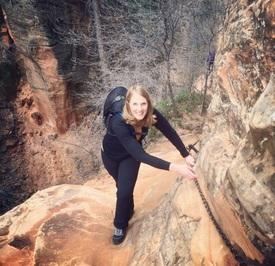How Accurate Are Handheld Body Fat Percentage Monitors?
Options

say_pocket
Posts: 54 Member
Ever since I started working out, I've been trying to focus on my body fat percentage rather than my weight. My gym has one of those handheld body fat percentage measuring things and my trainer helps me use it so I know I'm doing it right.
But how accurate are those things?
Tonight, I finally passed my goal body fat percentage. But I don't look the way I expected I would. Or look like the photos you see on google when you search "Women Body Fat Percentage Images". I'm wondering if the monitor could be wrong. Or if I just had unrealistic expectations about what 18% body fat would look like.
But how accurate are those things?
Tonight, I finally passed my goal body fat percentage. But I don't look the way I expected I would. Or look like the photos you see on google when you search "Women Body Fat Percentage Images". I'm wondering if the monitor could be wrong. Or if I just had unrealistic expectations about what 18% body fat would look like.
0
Replies
-
I don't know what the percentile of accuracy is, but I own an Omron and it fluctuates up to 2% within five minutes. I figure it can gauge trends, and that's what I use it to do.
However, the accuracy doesn't diminish your accomplishments! Congratulations on your progress!0 -
I used one at my gym a couple of years ago. I also found a website that you can plug your measurements into to get an idea of body fat % http://www.scientificpsychic.com/fitness/diet.html ... this is similar to what the Navy uses to determine body fat in their physical testings, as it takes your gender, height, neck, waist, and hips (for women) measurements and plugs it into a formula.
I cannot tell you how accurate they are, but the website that uses a formula to calculate body fat was not as "generous" as the hand held- meaning the handheld said I had less body fat than the formula did.0 -
Not very accurate. DC Rainmaker has a long article comparing various Fat % devices. Short version: they are all over the place.
Some people rate calipers more highly. I've never tried them but perhaps that is a more direct method.0 -
In college I was a serious cyclist... I had hydrostatic weighing done numerous times and each time we compared hydro to the caliper. Suffice to say that they were off a bit - at least for my experience with them when I was between 7% and 12% body fat. A lot will depend on the skill and consistency and knowledge of the person taking the measurement.0
-
I used an Omron hours before a Bodpod test, and they were within 1% point of each other.
That doesn't mean either is accurate, however, but my handheld Omron is tracking trends and that's what matters most.0 -
Body fat scales use Bioelectrical Impedance Analysis (BIA). A very small, harmless electrical current passes through your body tissues, slower through fat and quicker through muscle. Resistance is what is being measured. So, actually it is not analyzing your body fat percentage so much as your body density. The scale then takes this reading and uses a formula to give you a body fat percentage reading.
Are they accurate? No. They give an estimate and studies have concluded that body fat scales do not give precise readings. Consumer Reports tested body fat scales and found them all to be inaccurate. Factors such as body type, body temperature, hydration, and recent exercise can have a noteworthy impact on the number you see on the scale. Even wet or sweaty feet can skew the results. Whether or not you get a true analysis, what you can do is use that number to gauge your progress. But you must be consistent when you weigh yourself, so do it at the same time of day, drink/eat approximately the same amount, don't do it directly after exercising, and use it in a room that is generally a stable temperature. Utilize the body fat scale as a means of tracking trends rather than focusing on what that number is or comparing that number to what you think your body fat should be....0 -
Congratulations on the progress you have made! It possible to for the body fat percentage to reduce and not see much change in how you look, this happens in cases where you haven't lost lean body mass (only lost fat mass) or it may be because you have gained more muscles.
There's no method that accurately measures the bf%, they all have a percentage of error. You can track your progress by regularly taking the measurements, like every week and under the same conditions... a particular day in the morning after a bath and before breakfast. This helps to get consistent results even if they are not accurate.0
This discussion has been closed.
Categories
- All Categories
- 1.4M Health, Wellness and Goals
- 396.8K Introduce Yourself
- 44.2K Getting Started
- 260.9K Health and Weight Loss
- 176.3K Food and Nutrition
- 47.6K Recipes
- 232.8K Fitness and Exercise
- 451 Sleep, Mindfulness and Overall Wellness
- 6.5K Goal: Maintaining Weight
- 8.7K Goal: Gaining Weight and Body Building
- 153.3K Motivation and Support
- 8.3K Challenges
- 1.3K Debate Club
- 96.5K Chit-Chat
- 2.6K Fun and Games
- 4.5K MyFitnessPal Information
- 16 News and Announcements
- 18 MyFitnessPal Academy
- 1.4K Feature Suggestions and Ideas
- 3.1K MyFitnessPal Tech Support Questions





